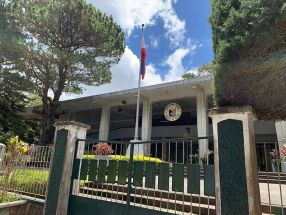Willful neglect

January 27, 2006 | 12:00am
Pity the Philippine Air Force pilot. His service command is the butt of jokes about being all air and no force. The PAF’s fleet of F-5 fighter jets has been put to pasture mainly because of old age.
The PAF makes do with OV-10 Broncos, a light attack aircraft first used by the US Marines in Vietnam in 1968 and phased out by the US armed forces in 1995.
Now the PAF has also indefinitely grounded its OV-10 fleet following the crash of a Bronco that killed its pilot last Tuesday in a fishpond in Paombong, Bulacan.
The pilot, Capt. Aniano Amatong Jr., had refused to parachute to safety after the aircraft developed engine trouble. Instead he steered the plane away from residential areas and told his co-pilot to bail out. Unable to eject on time himself, Amatong went down with the plane.
Amatong, who had logged in over 1,000 flight hours, was a member of Class ’96 of the Philippine Military Academy.
That was a tragic loss of life and the state’s investment in a professional soldier. And the loss won’t be the last. The PAF still has enough planes and helicopters that are bound to crash either from poor maintenance or sheer old age.
When will we give the Philippine soldier enough resources to perform his tasks well?
Those tasks, as we well know, do not involve purely combat operations. The military has numerous peacetime duties, including relief and rescue operations as well as patrols to protect territorial integrity.
The twin-turboprop OV-10, ideal for close air support, visual reconnaissance and guerrilla warfare, can be converted into a STOL or short take-off and landing utility vehicle for non-combat operations.
With the remaining OV-10 grounded, PAF pilots are left with crash-prone Italian-made trainer jets, a few cargo planes and the PAF’s workhorse, the Vietnam War-vintage UH1H helicopter.
The picture is just as bad for the other major service commands. Our Navy has such an acute lack of ships that during regional military exercises, where other countries send naval vessels with their troops, we send merely observers. When our Navy pursues poachers and intruders in Philippine territorial waters, the ships run out of gas.
We could not even chase away the Chinese as they set up a primitive garrison on a reef aptly named Mischief although the reef is within spitting distance of Palawan and a very long way from China.
Military abuses during the martial law years coupled with aggressive propaganda by the political arm of the communist movement, which naturally does not want a well-equipped and efficient Armed Forces of the Philippines (AFP), have left Filipinos with the impression that defense spending beyond the barest minimum is frivolous.
This mindset persisted even after the Senate kicked out US troops in 1992. There was no provision to replace even a fraction of what the AFP lost in getting out of the American security umbrella. There was no effort to create a professional armed force with decent equipment to carry out its task of defending the republic from all types of threats.
Today the Philippine Air Force is increasingly looking like a decommissioned plane that is slowly being cannibalized for scrap.
Abu Sayyaf bandits, smugglers and drug dealers have faster ships (and more fuel) than our Navy.
Islamic extremists are better armed than many members of the Philippine Army.
The willful neglect of the AFP has had consequences graver than our loss of Mischief Reef, which we claim as our own.
Poor equipment and the lack of necessities especially for soldiers in the frontlines were among the valid grievances aired by the Oakwood mutineers in 2003. Coupled with corruption at high levels of the AFP, the grievances continue to keep the coup culture alive.
An ongoing defense reform program seeks to address some of the basic problems. Emergency medical response for soldiers in the field has been upgraded. Last month the Philippine Army inaugurated the first of 16 six-bedroom, air-conditioned "transient facilities" that will be set up nationwide to provide affordable accommodations for soldiers on temporary assignment outside their regular posting. Each P3-million facility can accommodate up to four officers and 16 enlisted personnel. Soldiers pay P100 a night.
The defense reform program is being implemented with the help of Uncle Sam. Willful neglect has also forced the AFP to remain dependent on foreign aid, mostly from the country’s long-time ally and the world’s lone superpower.
Any self-respecting Filipino soldier will tell you that he would rather do his own fighting against terrorists and rebels anywhere in the country. The same soldier, however, will also tell you that he can use whatever help he can get in his fight. And if the Americans are willing to help, why turn them away? No other country comes close to the level of military assistance offered to the AFP by the United States.
It will be a great day when we can shout to the world, like the Indians and Malaysians, that we don’t need foreign troops even for relief efforts during natural disasters. A country must have an independent armed force to protect its sovereignty and territorial integrity. The sad fact, however, is that we have failed to develop that independence in the AFP.
Those who are noisily calling for the scrapping of the Visiting Forces Agreement, without renegotiation, and for sending all US troops packing once more, never to return, should first make sure the AFP will be able to stand on its own feet this time. Our policy-makers cannot keep slinking to Washington when the nationalistic fervor has died down, asking Uncle Sam to come back, and please don’t forget to bring more aid.
We have efficient, dedicated men and women in the AFP, and the courageous PAF Capt. Aniano Amatong Jr. was but the latest example.
It is a shame to leave them without the equipment they need to perform their tasks. Even when confronted with death, however, the AFP can barely take care of its own.
For Amatong’s heroism, his heirs will get death and accident benefits as well as insurance amounting to about P100,000. They will also get P45,000 from the PAF Mutual Relief System, a monthly pension of P6,000 and P1,200 for burial expenses — an amount that should pay for one wreath. Consider those figures and weep.
The PAF makes do with OV-10 Broncos, a light attack aircraft first used by the US Marines in Vietnam in 1968 and phased out by the US armed forces in 1995.
Now the PAF has also indefinitely grounded its OV-10 fleet following the crash of a Bronco that killed its pilot last Tuesday in a fishpond in Paombong, Bulacan.
The pilot, Capt. Aniano Amatong Jr., had refused to parachute to safety after the aircraft developed engine trouble. Instead he steered the plane away from residential areas and told his co-pilot to bail out. Unable to eject on time himself, Amatong went down with the plane.
Amatong, who had logged in over 1,000 flight hours, was a member of Class ’96 of the Philippine Military Academy.
That was a tragic loss of life and the state’s investment in a professional soldier. And the loss won’t be the last. The PAF still has enough planes and helicopters that are bound to crash either from poor maintenance or sheer old age.
When will we give the Philippine soldier enough resources to perform his tasks well?
The twin-turboprop OV-10, ideal for close air support, visual reconnaissance and guerrilla warfare, can be converted into a STOL or short take-off and landing utility vehicle for non-combat operations.
With the remaining OV-10 grounded, PAF pilots are left with crash-prone Italian-made trainer jets, a few cargo planes and the PAF’s workhorse, the Vietnam War-vintage UH1H helicopter.
The picture is just as bad for the other major service commands. Our Navy has such an acute lack of ships that during regional military exercises, where other countries send naval vessels with their troops, we send merely observers. When our Navy pursues poachers and intruders in Philippine territorial waters, the ships run out of gas.
We could not even chase away the Chinese as they set up a primitive garrison on a reef aptly named Mischief although the reef is within spitting distance of Palawan and a very long way from China.
Military abuses during the martial law years coupled with aggressive propaganda by the political arm of the communist movement, which naturally does not want a well-equipped and efficient Armed Forces of the Philippines (AFP), have left Filipinos with the impression that defense spending beyond the barest minimum is frivolous.
This mindset persisted even after the Senate kicked out US troops in 1992. There was no provision to replace even a fraction of what the AFP lost in getting out of the American security umbrella. There was no effort to create a professional armed force with decent equipment to carry out its task of defending the republic from all types of threats.
Abu Sayyaf bandits, smugglers and drug dealers have faster ships (and more fuel) than our Navy.
Islamic extremists are better armed than many members of the Philippine Army.
The willful neglect of the AFP has had consequences graver than our loss of Mischief Reef, which we claim as our own.
Poor equipment and the lack of necessities especially for soldiers in the frontlines were among the valid grievances aired by the Oakwood mutineers in 2003. Coupled with corruption at high levels of the AFP, the grievances continue to keep the coup culture alive.
An ongoing defense reform program seeks to address some of the basic problems. Emergency medical response for soldiers in the field has been upgraded. Last month the Philippine Army inaugurated the first of 16 six-bedroom, air-conditioned "transient facilities" that will be set up nationwide to provide affordable accommodations for soldiers on temporary assignment outside their regular posting. Each P3-million facility can accommodate up to four officers and 16 enlisted personnel. Soldiers pay P100 a night.
The defense reform program is being implemented with the help of Uncle Sam. Willful neglect has also forced the AFP to remain dependent on foreign aid, mostly from the country’s long-time ally and the world’s lone superpower.
Any self-respecting Filipino soldier will tell you that he would rather do his own fighting against terrorists and rebels anywhere in the country. The same soldier, however, will also tell you that he can use whatever help he can get in his fight. And if the Americans are willing to help, why turn them away? No other country comes close to the level of military assistance offered to the AFP by the United States.
It will be a great day when we can shout to the world, like the Indians and Malaysians, that we don’t need foreign troops even for relief efforts during natural disasters. A country must have an independent armed force to protect its sovereignty and territorial integrity. The sad fact, however, is that we have failed to develop that independence in the AFP.
Those who are noisily calling for the scrapping of the Visiting Forces Agreement, without renegotiation, and for sending all US troops packing once more, never to return, should first make sure the AFP will be able to stand on its own feet this time. Our policy-makers cannot keep slinking to Washington when the nationalistic fervor has died down, asking Uncle Sam to come back, and please don’t forget to bring more aid.
It is a shame to leave them without the equipment they need to perform their tasks. Even when confronted with death, however, the AFP can barely take care of its own.
For Amatong’s heroism, his heirs will get death and accident benefits as well as insurance amounting to about P100,000. They will also get P45,000 from the PAF Mutual Relief System, a monthly pension of P6,000 and P1,200 for burial expenses — an amount that should pay for one wreath. Consider those figures and weep.
BrandSpace Articles
<
>
- Latest
- Trending
Trending
Latest
Trending
Recommended

April 23, 2025 - 2:49pm























